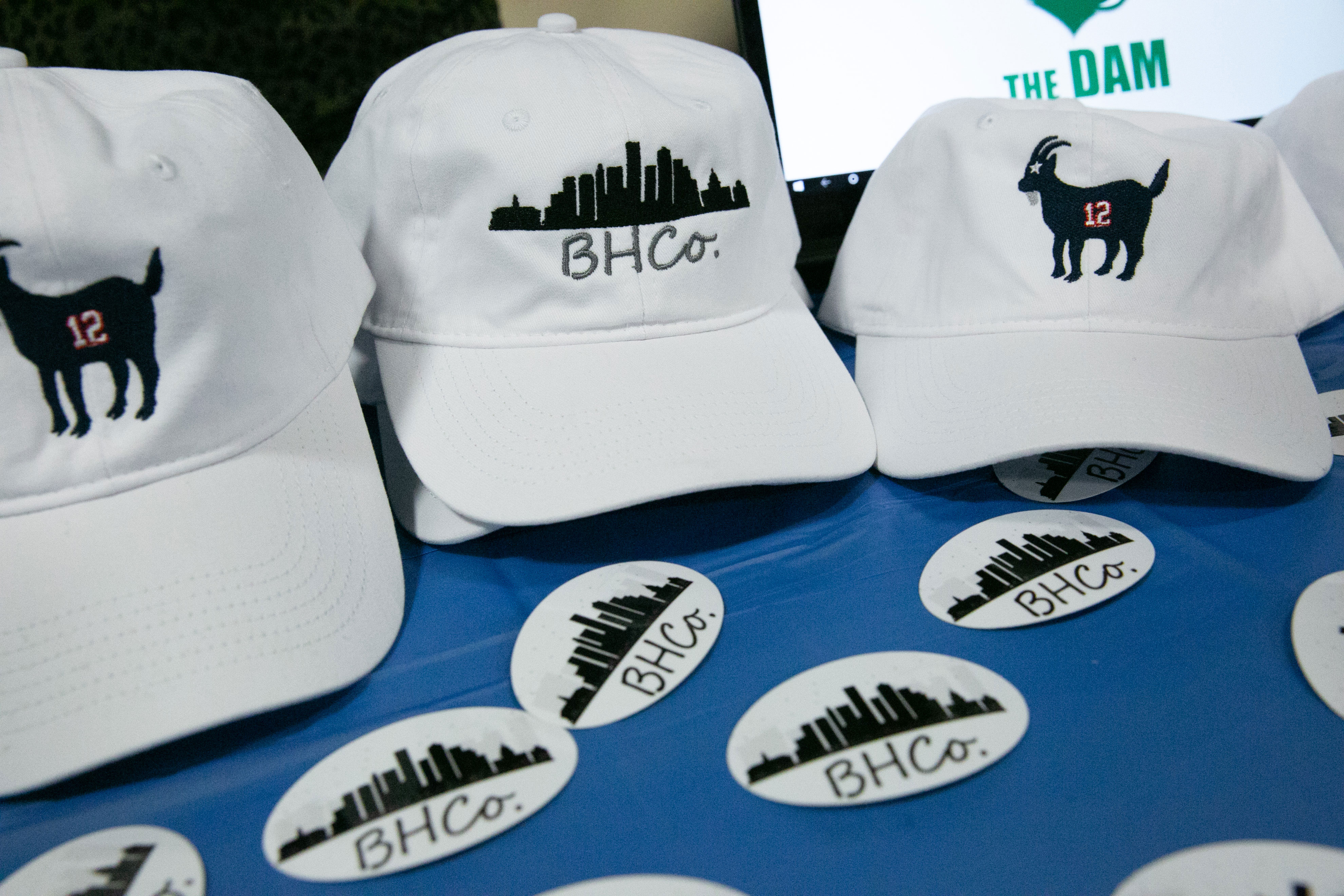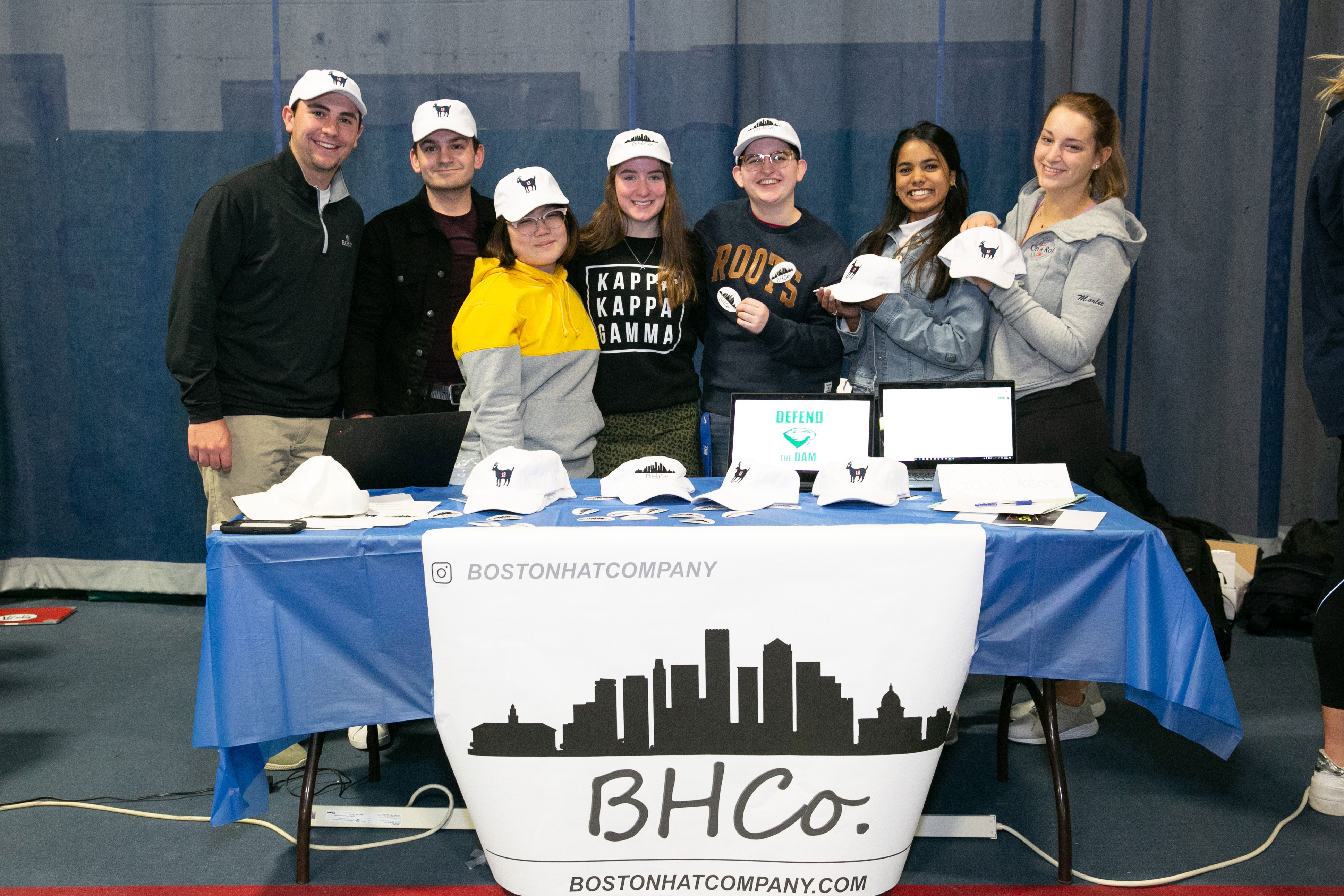Launching a Business as a First-Year Student
From the outside, September 26 may have seemed like an ordinary day on Babson College’s Wellesley campus.
But, within the walls of Tomasso Hall, the day was anything but ordinary. It’s Rocket Pitch day for first-year students in Foundations of Management and Entrepreneurship (FME); students who have been on campus for less than one month.
In one corner, a student rehearses a pitch for a venture that ensures Babson businesses get as much publicity as possible. In another, a student fidgets nervously, studiously memorizing the content of six strategically placed Post-it notes. Elsewhere, a student fixes his teammate’s tie.
Co-teachers Danna Greenberg, Walter H. Carpenter Professor of Organizational Behavior, and Angela Randolph, Assistant Professor of Entrepreneurship, take their seats. A timer is set to three minutes. When that clock runs out, a team is done, whether they’ve finished their pitch or not. With that, Rocket Pitches begin.
A Rocket Pitch Moment
For many of the students in the room, this is the first time they’ve been charged with pitching a venture. But, the best way to learn business and entrepreneurship is to run an actual venture, and that’s the point of FME. In the internationally recognized yearlong course, all Babson first-year students join teams to create, develop, launch, and manage a real venture.
Among those students is Sophie Jamison ’22. On the day of Rocket Pitch, she and her teammates are dressed professionally, but donning baseball caps. At the start of the pitch, she asks the room, “How many of you have more than one hat in your wardrobe?”
Jamison herself has more than 20 hats in her room. The goal of her team’s venture, Heart to Head, is to diversify hat style by offering detachable patches for baseball caps, and interchangeable pompoms for winter hats. It’s all about maximizing space—“college units have the least amount of storage”—while simplifying a wardrobe and inspiring creativity.
“The rocket pitch sets the expectation for this exciting, fast-paced year of learning and doing.”
Danna Greenberg, Walter H. Carpenter Professor of Organizational Behavior
Heart to Head is one of 11 groups in Greenberg and Randolph’s class. Other ventures pitched that day included a customizable beauty box, a car pool app for parents, and a late-night snack delivery service, among others.
“The rocket pitch is critical to teaching students how to act their way into opportunities. Within a month of arriving on campus, they have already learned basic design thinking skills, have identified a problem space, and are pitching solutions,” said Greenberg. “The rocket pitch sets the expectation for this exciting, fast-paced year of learning and doing.”
Only five of the ventures will progress beyond the day’s pitches. Once class concludes, students will rank each idea to determine which ideas should move forward, and which venture they’d like to work on.
Learning by Doing
For more than 20 years, FME has trained student teams of budding entrepreneurial leaders in the art of conceiving, launching, and managing a new venture. Throughout the year, students are exposed to entrepreneurship, marketing, business management, and organizational behavior. The course follows a “learn by doing” approach, where students get hands-on experience practicing Entrepreneurial Thought & Action® to develop new ventures that create economic and social value. Rocket Pitch is the first of many such immersive moments in the FME journey.
“FME is one of the reasons I chose to attend Babson,” said Jamison. That enthusiasm, coupled with her entrepreneurial experience—she’s an ambassador for Hasbro’s Nerf products, and has a thriving Instagram account with more than 16,000 followers—helped her feel confident going into the class. However, she admitted, she still had a lot to learn. “Working with a big team, launching a business, running accounting—I had no experience with any of that.”
She developed that experience with Heart to Head, which was voted to progress beyond Rocket Pitches. Along the way new team members joined the venture. But, over the course of the fall semester, which included a prototyping workshop, a prototyping fair, a feasibility study and a final launch plan, the team made a few pivots.
“We were really excited about our initial idea, but eventually realized there was already a market for the product and that it would be tough to find a supplier,” said Jamison. “We had to restart our whole business, essentially start from scratch.”
An FME Spring
By spring, an entirely new, hat-inspired venture emerged: The Boston Hat Company. They sold Boston-themed hats designed by local artists, ultimately creating “hats with a wicked awesome purpose.”

“As more hat enthusiasts joined our team, we realized we had an opportunity—to sell custom Boston-themed hats,” said Jamison. As Boston Hat Company, she said, they can simultaneously support local artists while exploring their creative interests.
Creativity has been a theme of the entire FME journey for Jamison, who took on the role as the company’s head of social media marketing and graphic design. That role included teaching herself Photoshop and designing the custom logos customers requested. “FME is the perfect opportunity to try new things. I now consider myself proficient in Photoshop, so it has been a really enriching experience.”
The fruit of that creative labor was on display for the entire Babson community to see during the spring FME Expo. The entire team wore one of Jamison’s favorite designs—a goat, inspired by New England Patriots quarterback Tom Brady. And, the feedback from customers, she said, was overwhelmingly positive. “People kept coming back to the table to look at them again and again. It was exciting.”
That excitement translated into sales, but for Jamison that was only one component of success. The less tangible goals are just as rewarding, like partnering with local groups to design small batch custom hats. Or learning and growing together as a team. Jamison credits the course, plus the support of her professors and FME mentors, with that final pillar of success.

“My professors are always able to give support and help problem solve,” she said. “And, they don’t just give the answers; they give you ideas, and new routes to take so you can come to a conclusion yourself. I really value that.”
The team did face challenges along the way. Group sales fell through. Designs went unapproved. Artists backed out at the last minute. “Looking back, I appreciate those challenges,” she said. “They made us become more resourceful, and problem solve in ways we hadn’t originally imagined.”
Shutting Down and Wrapping Up
As the spring semester wraps up, students liquidate their ventures, donate profits to charity, and share the highs and lows of their semester-long experience. FME concludes each year with a formal report to the community.
“FME is much more than starting and closing a business, it leaves our students transformed by the experience and it is an essential milestone for further exploration and then focus in the years that follow at Babson.”
Ian Lapp, Dean of the Undergraduate School
For Jamison, it’s the conclusion of an exciting and rewarding experience of lessons in and out of the classroom. Her favorite moment of the entire year? Seeing her team’s product for the very first time. “It was such a fulfilling feeling to finally have them in hand, to be able to see them after working on it for what felt like a long time.”
“From pitching to prototyping to storyboarding in the first six weeks of our students’ Babson experience, you would be hard-pressed to find another college that launches learning as we do. As Sophie’s FME journey showcases, this is just the beginning, her entire first year she benefits from two professors who teach, mentor, and guide her intellectual, personal, and professional growth,” said Ian Lapp, Dean of the Undergraduate School. “Mix in peer-to-peer learning and the leadership and teamwork skills that result from this immersive experience and you see that FME is much more than starting and closing a business, it leaves our students transformed by the experience and it is an essential milestone for further exploration and then focus in the years that follow at Babson.”
Though her experience in FME is coming to a close, Jamison isn’t done being entrepreneurial. The class, she said, opened her mind to the possibility of starting a business of her own one day. Or, perhaps she’ll pursue graphic design. Though she hasn’t decided yet, she’s taking the experience with her for the rest of her journey at Babson and beyond—including one of the most valuable lessons of them all.
“It’s important to make mistakes,” she said. “Learn from them. If you’re always succeeding, you don’t build resiliency or resourcefulness. I learned in FME to not be afraid of failing—you’ll grow more as a person, and as an entrepreneur.”
Posted in Community
